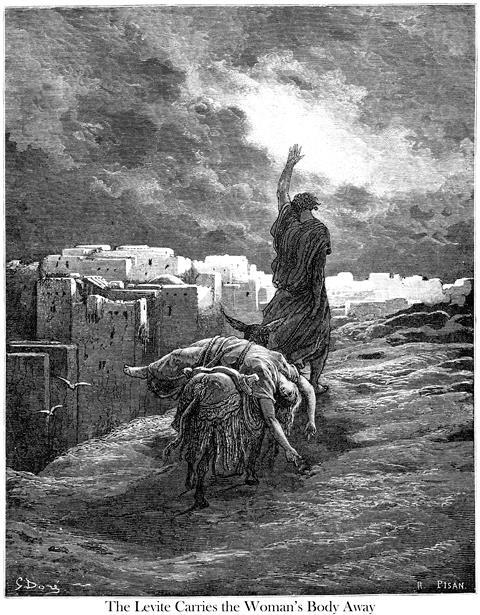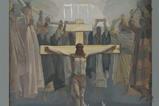Elaine Storkey unpacks an Old Testament example of disturbing patriarchal violence, before revealing how the New Testament highlights the high value God places on women

Study passage: Judges 19
In many parts of the world today the persecution of women is not uncommon. I discovered this when I was travelling and doing research for my book Scars Across Humanity (SPCK). I found that in very different cultures, women and girls are often targeted for discrimination and persecution and have painful, difficult lives. Often such persecution is sexual in form, and inflicted by individual people like rapists, or brutal partners in intimate relationships. Sometimes it is from individuals with authority, who want to display their power over women. I found, too, that discrimination is often woven into the very way of life of some cultures and reinforced in violent practices.
We could take female genital mutilation as an obvious example. In at least 28 countries, a girl can suffer persecution simply for being a girl – to the extent of having her genitals cut and mutilated, usually without anaesthetic and with consequences that last for the rest of her life. The message that lies underneath this barbaric practice is clear: a woman’s sexuality does not belong to her but to the man she will inevitably marry, so cutting into her labia and stitching her up will ensure she is a virgin on her wedding night.
Early enforced marriage is another form of persecution, where a girl who doesn’t want to be married off to someone her family chooses – a man who might be insensitive or even cruel – finds she has no rights in that country’s law to refuse. Yet another form is ‘honour’ persecution, where a woman can be locked away, beaten or even stoned if she steps out of the tight restrictions imposed on her by her family or community. Where military conflict is dominant, persecution could even be in the form of enemy militia systematically raping women as a weapon of war. We don’t have to look far for examples of how the persecution of women scars the face of humanity.
Patriarchal societies and the Bible
The findings in my book are echoed by important work done through other organisations. Open Doors, for example, is a charity that has spent many years examining areas of the world where Christians regularly undergo persecution as minority cultures at the mercy of those who would do them harm. In their recent reports, Open Doors has carefully documented the ways in which Christian women are doubly vulnerable to persecution – both because of their faith and because they are women.
Discrimination is often woven into the very way of life of some cultures
So, it should not come as a surprise to find that stories of women’s persecution are also in the Bible. In fact it would be strange if it were otherwise. For much of the Bible is written against the backcloth of patriarchal societies in which decisions and attitudes towards women were formed by a dominant male culture. And in those cultures too, women were often treated with disrespect and indifference. So we would expect biblical authors who narrated the events of their time to include incidents where women suffered persecution – often with sexual brutality. The important point for us is to understand why this persecution occurred and what these stories in the Bible convey about the relationships between women and men. One thing we learn quickly is that power always corrupts those who abuse it and makes women more vulnerable. We also learn how far sinful human beings can fall from the principles of life that God requires of us.
Most of the stories of persecution occur in the Hebrew scriptures, for the authors of the Old Testament were not coy about letting us know the extent and consequence of human sin. Distressing accounts of abuse of women and their persecution come in stories like those of Hagar (Genesis 16:5-6), Dinah (Genesis 34), Tamar (2 Samuel 13), Jephthah’s daughter (Judges 11) and Vashti (Esther 1).
A close look at Judges 19
One of the most graphic passages of inhumanity towards women is the famous account of the rape of the concubine in Judges 19. The concubine (a sexual partner who is not a wife) ran away from the Levite man who had taken her, back to her father’s home in Bethlehem. After four months, the Levite travelled to Bethlehem to take her back. The father greeted him affably but clearly did not want his daughter to return and managed to delay the man for four days. He tried again on the fifth day but the Levite was determined to go and left by late afternoon. The journey was long and, to avoid being stranded in non-Hebrew territory, they travelled until nightfall when they reached land occupied by the Benjaminite clan. Waiting in the market square, however, they didn’t get offers of hospitality until an old man from out of town invited them to his home.
Things turned out very badly. Some “wicked men of the city” demanded the man “bring out” his male guest so they could have sex with him (v22, with overtones of Genesis 19 and a similar notorious incident in Sodom city). The old man rebuked them and offered instead his virgin daughter and the man’s concubine for them to “do to them whatever you wish”(v24). The men took the concubine, raped her all night and dropped her back at the house in the morning. The Levite arose from sleep, asked her to get ready to leave, but she didn’t answer. So, he put her on his donkey and, once he completed the journey home, took a knife and cut her into twelve parts. He then sent her limbs and body bits around the tribes of Israel to express his outrage at what had happened to him. The Israelites assembled together to hear the Levite accuse the Benjaminites of intending to kill him and then raping his concubine who subsequently died (Judges 20). The eventual outcome was a bloody war between the tribe of Benjamin and the rest of Israel, where tens of thousands of men were killed.
Power always corrupts those who abuse it and makes women more vulnerable
This horrific story illustrates such a distorted view of the value of women and men that it takes our breath away. Both the old man and the Levite were prepared to collude in the persecution of their womenfolk, for whom they should, at the very least, have had some concern and pastoral responsibility. The Levite was far more outraged at the offence to himself than to his concubine, and the disdain he showed to her body indicates he saw her less as a person than a piece of property. Biblical scholar, Peter Williams, raises an even more sinister question when he hints at the ambiguity surrounding the concubine’s death. Was she raped till she died, as the Levite implies to the assembly, or simply very badly wounded, and finished off by his cutting her up? The text is silent on the issue!

Reading such texts with contemporary eyes
So how do we interpret this horrendous story (and others in the Bible where women are treated appallingly)? We need to look at the context, why such stories are included in the Bible and the lessons to be learned from them. The story in Judges was set in a time when Israel was without a king or proper government and the people lived in moral chaos. Tribal conflict was frequent; men did what they wanted; women had no rights, and lived under the authority of men – who could harm them with impunity. Without protective laws, implemented by a proper judicial system, women’s vulnerability was at its highest.
We also need to recognise the difference between description and prescription. An incident described in the scriptures is simply an account of what happened. It tells us what people were like, not how God wanted them to live. Nothing in the text suggests that this attitude towards women was being prescribed by the biblical author or that it, even remotely, had God’s approval. Instead, the consequent uproar and carnage that followed could be seen as God simply leaving them to reap the ugly fruits of the callous brutality they themselves had sown. What we do learn most of all from this passage is the sheer extent of human sin, and the desperate need for some way through it.
The New Testament Gospels, Acts and letters show how that need is met in Jesus’ life and atoning death and offer the final word on Judges 19. Jesus had close women friends and in all his encounters with women showed deep respect and care for their needs, sometimes even making himself vulnerable (John 4:9). He rebuked his disciples when they exhibited traditional patriarchal attitudes or were less than respectful to women. Peter cautioned against any form of violation when he urged that women’s vulnerability must be honoured and respected (1 Peter 3:7). Paul gave wives and husbands mutual authority over each other’s bodies (1 Corinthians 7) and commended the ministry of Priscilla, Phoebe and others (see Acts 16:1, for example). Although also written into a patriarchal culture, the New Testament reveals God’s high value of women, and endorses equal respect between women and men. No biblical justification exists for diminishing women, let alone persecuting them.

































No comments yet